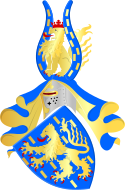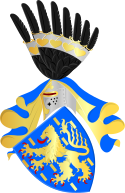1255
► | قرن 12 | << قرن 13 >> | قرن 14 | ◄
► | عقد 1220 | عقد 1230 | عقد 1240 | << عقد 1250 >> | عقد 1260 | عقد 1270 | عقد 1280 | ◄
► | ► | 1250 | 1251 | 1252 | 1253 | 1254 | << 1255 >> | 1256 | 1257 | 1258 | 1259 | 1260 | ◄ | ◄
تحويل 1-1-1255م الى هجري (وصلة خارجية) | تحويل 31-12-1255م الى هجري (وصلة خارجية) | ابحث في الموسوعة عن مواضيع متعلقة بسنة 1255
| ألفية: | الألفية 2 |
|---|---|
| قرون: | القرن 12 – القرن 13 – القرن 14 |
| عقود: | عقد 1220 عقد 1230 عقد 1240 – عقد 1250 – عقد 1260 عقد 1270 عقد 1280 |
| سنين: | 1252 1253 1254 – 1255 – 1256 1257 1258 |
تقاسم الشقيقان أوتو الأول و والرام الأول من ناسو|والرام الأول أراضي ناسو وأسسا فرعين من بيت ناسو. الأرضان لم يتوحدا حتى 1806.
| 1255 حسب الموضوع | |
| السياسة | |
| زعماء الدول – الدول ذات السيادة | |
| تصنيفا المواليد والوفيات | |
| المواليد – الوفيات | |
| تصنيفا التأسيسات والانحلالات | |
| التأسيسات – الانحلالات | |
| الفن والأدب | |
| 1255 في الشعر | |
| التقويم الگريگوري | 1255 MCCLV |
| آب أوربه كونديتا | 2008 |
| التقويم الأرمني | 704 ԹՎ ՉԴ |
| التقويم الآشوري | 6005 |
| التقويم البهائي | −589 – −588 |
| التقويم البنغالي | 662 |
| التقويم الأمازيغي | 2205 |
| سنة العهد الإنگليزي | 39 Hen. 3 – 40 Hen. 3 |
| التقويم البوذي | 1799 |
| التقويم البورمي | 617 |
| التقويم البيزنطي | 6763–6764 |
| التقويم الصيني | 甲寅年 (الخشب النمر) 3951 أو 3891 — إلى — 乙卯年 (الخشب الأرنب) 3952 أو 3892 |
| التقويم القبطي | 971–972 |
| التقويم الديسكوردي | 2421 |
| التقويم الإثيوپي | 1247–1248 |
| التقويم العبري | 5015–5016 |
| التقاويم الهندوسية | |
| - ڤيكرام سامڤات | 1311–1312 |
| - شاكا سامڤات | 1177–1178 |
| - كالي يوگا | 4356–4357 |
| تقويم الهولوسين | 11255 |
| تقويم الإگبو | 255–256 |
| التقويم الإيراني | 633–634 |
| التقويم الهجري | 652–653 |
| التقويم الياباني | Kenchō 7 (建長7年) |
| تقويم جوچى | N/A |
| التقويم اليوليوسي | 1255 MCCLV |
| التقويم الكوري | 3588 |
| تقويم مينگوو | 657 قبل جمهورية الصين 民前657年 |
| التقويم الشمسي التايلندي | 1798 |
Year 1255 (MCCLV) was a common year starting on Friday of the Julian calendar.
أحداث
حسب المكان
أفريقيا
- بداية عهد مانسا أوليه، مانسا (ملك) ماندن (حتى 1270). A peaceful and pious sovereign, he organized a system of great command entrusted to loyal generals, whose action extended the kingdom of Mali to the West [ 1 ] . His reign marked the beginning of the development of Islam .
آسيا
- 1 ديسمبر - علاء الدين محمد الثالث، الإمام رقم 26 للشيعة الإسماعيلية النزارية وسابع حكام قلعة الموت، يُغتال أثناء نومه على يد أقرب مخلصيه، حسن المزندراني، بضربة بلطة أثناء تفقده أملاكه. ابنه وخليفته، ركن الدين خورشاه، who had been publicly abused several times by his father, has the murderer and several of his family members executed, but the rumor persists that the act was done with his consent.
- بعد وفاة باطو خان في سراي، ابنه سرتق خان، ولي العهد المسمى والذي كان مقيماً لدى الخاقان مونگكه في قراقورم، يصبح رأس قپچاق أولوس وحاكم القبيل الذهبي والقبيل الأزرق للمنغول. إلا أنه يموت فجأة ليخلفه ابنه أولاكچي، الذي عُيِّن خاناً على القبيل الذهبي تحت وصاية بوراكچيك، أرملة باطو (حتى 1257).
أوروبا
- 25 فبراير - Battle of Montebruno: Guelph forces under Thomas II of Savoy invade the Ghibelline territory of Asti (located in the Piedmont region), but he is defeated by the Astigiani army, led by William VII, at Garzigliana (شمال إيطاليا). توماس يتراجع ويلجأ في تورينو؛ إلا أن الگبلين قد أسِروه لاحقاً .
- مايو - William of Rubruck from Constantinople returns to Cyprus from his missionary journey to convert the Mongols of central and eastern Asia; his efforts have been unsuccessful.
- الحرب البلغارية البيزنطية: Emperor Theodore II Laskaris, who is in exile in the Empire of Nicaea, conducts a military campaign to recover Thrace from the Bulgarians. The Bulgarian Tsar Michael II Asen , who had lost numerous territories to the Byzantine Empire in recent years , attempted to exploit the previous year's change of throne in the Nicaea Empire and marched his troops into Thrace . The new Emperor Theodore II then launched a counteroffensive. In the ensuing peace agreement, Bulgaria was forced to cede further territories and lost all of Thrace, with the exception of the coastal cities.
- الملك أفونسو الثالث من البرتغال ("the Boulonnais") moves his residence and royal court from Lisbon to Coimbra, which becomes the capital of Portugal.
- The Teutonic Knights in Prussia found Königsberg (modern-day Kaliningrad) and name it in honour of King Ottokar II of Bohemia.
- The lands of the House of Nassau are divided between the brothers Walram II and Otto I, not to be reunited until 1806.
الجزر البريطانية
- June – Battle of Bryn Derwin: Llywelyn ap Gruffudd defeats his two brothers Dafydd ap Gruffydd and Owain Goch ap Gruffydd, to become sole ruler of northern Wales. Dafydd and Owain are both imprisoned.[1]
- August – Following the death of Little Saint Hugh, in an instance of blood libel, eighteen Jews of Lincoln, are tortured and executed by royal command on suspicion of being involved in the boy's murder.[1]
- A survey of royal privileges is conducted, which is included in the Hundred Rolls, a census seen as a follow-up to the Domesday Book (completed in 1086). The Hundred Rolls is later completed with two larger surveys, in 1274/75 and 1279/80.[2]
حسب الموضوع
الفنون والثقافة
- The Gothic cathedral at Bourges in central فرنسا, is completed (it will become a UNESCO World Heritage Site).
المدن والبلدات
- The town of Banská Bystrica (located in central Slovakia) is granted municipal privileges by King Béla IV of Hungary.
السوق
- Orlando Bonsignori, an Italian minor merchant, forms a consortium called the Gran Tavola ("Great Table"), which becomes the most powerful bank in western Europe. He becomes the exclusive banker for the deposits of the income of the Papal States.[3]
مواليد
- October 23 – Fernando de la Cerda, Spanish prince (d. 1275)
- Adolf of Nassau-Weilburg, king of Germany (d. 1298)
- Albert I of Germany, Holy Roman Emperor (d. 1308)
- Andrey of Gorodets, Kievan Grand Prince (d. 1304)
- Bogislaw IV, Polish nobleman and knight (d. 1309)
- Dino Compagni, Italian historian and writer (d. 1324)
- Francesca da Rimini, Italian noblewoman (d. 1285)
- John of Paris, French theologian and writer (d. 1306)
- Margherita Colonna, Italian nun and abbess (d. 1280)
- Nicholas I, Bohemian nobleman and knight (d. 1318)
- William Ros, Scottish nobleman and knight (d. 1316)
- Sanjar al-Jawli, Mamluk governor and ruler (d. 1345)
- Sybille of Bâgé, countess consort of Savoy (d. 1294)
- Takaoka Muneyasu, Japanese nobleman (d. 1326)
وفيات
- May 1 – Walter de Gray, English archbishop and statesman
- August 27 – Little Saint Hugh, English Jewish boy (b. 1246)
- Al-Faqih al-Muqaddam, Yemeni religious leader (b. 1178)
- Alice de Montfort, French noblewoman and ruler (suo jure)
- Batu Khan, Mongol ruler and founder of the Golden Horde
- Carintana dalle Carceri, ruler of the Principality of Achaea
- Denis Türje, Hungarian nobleman and military commander[4]
- Eva de Braose, heiresses and wife of William de Cantilupe
- Helena Pedersdatter Strange, queen of Sweden (b. 1200)
- Majd al-Din ibn Taymiyyah, Seljuk judge and theologian
- Masanari, Japanese nobleman and waka poet (b. 1200)
- Muhammad III, ruler of the Nizari Ismaili State (b. 1211)
- Shams al-Din 'Ali ibn Mas'ud, Mihrabanid ruler of Sistan
المراجع
- ^ أ ب Palmer, Alan; Palmer, Veronica (1992). The Chronology of British History. London: Century Ltd. pp. 84–86. ISBN 0-7126-5616-2.
- ^ Cam, Helen (1921). Studies in the hundred rolls: some aspects of thirteenth-century administration. Oxford: Clarendon Press.
- ^ Catoni, Giuliano. "Bonsignori". Dizionario Biografico degli Italiani. Retrieved 20 December 2011.
- ^ Zsoldos, Attila (2011). Magyarország világi archontológiája, 1000–1301 [Secular Archontology of Hungary, 1000–1301] (in الهنغارية). História, MTA Történettudományi Intézete. p. 296. ISBN 978-963-9627-38-3.
All content in this article is created by Marefa contributors and is © Marefa. All rights reserved.

